I'll research small front yard landscaping ideas to provide comprehensive, current information for this article.
**Web Search Results Analysis: ** - Small front yards require strategic design approaches maximizing limited space - Popular trends include native plants, vertical gardens, container gardening, and low-maintenance designs - Key considerations: curb appeal, functionality, maintenance requirements, and seasonal interest - Sub-topics: drought-tolerant landscaping, foundation plantings, pathways, lighting, color schemes, privacy solutions, and sustainable practices
Small front yards present unique opportunities to create stunning landscapes that maximize curb appeal within limited compact areas require thoughtful planning to balance functionality, beauty, and maintenance working with narrow strips, sloped terrain, or challenging conditions, strategic design choices can transform even the smallest front yard into an inviting entrance that reflects your personal style while enhancing your home's value and neighborhood appeal.
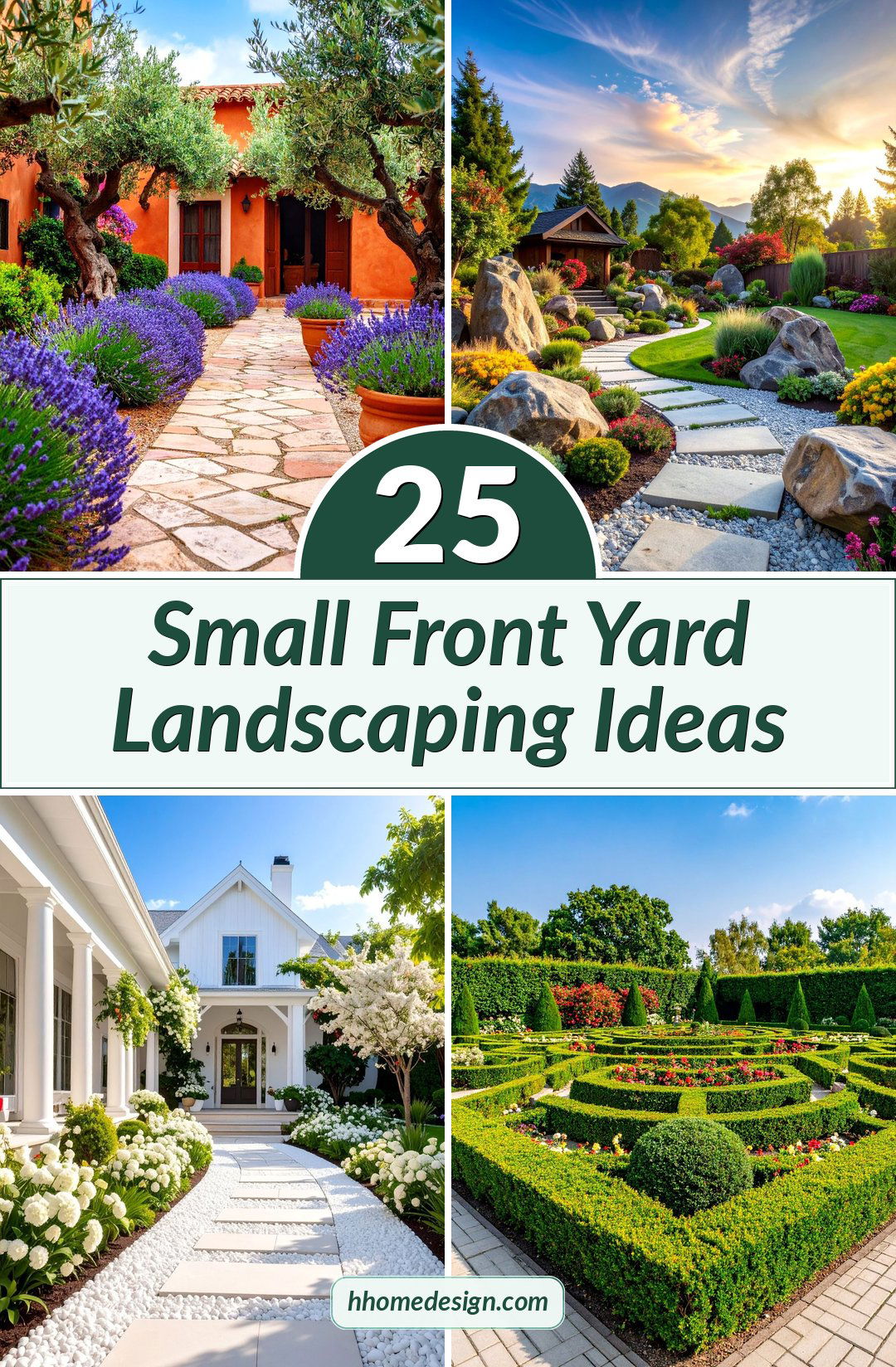
1. Drought-Tolerant Native Plant Garden
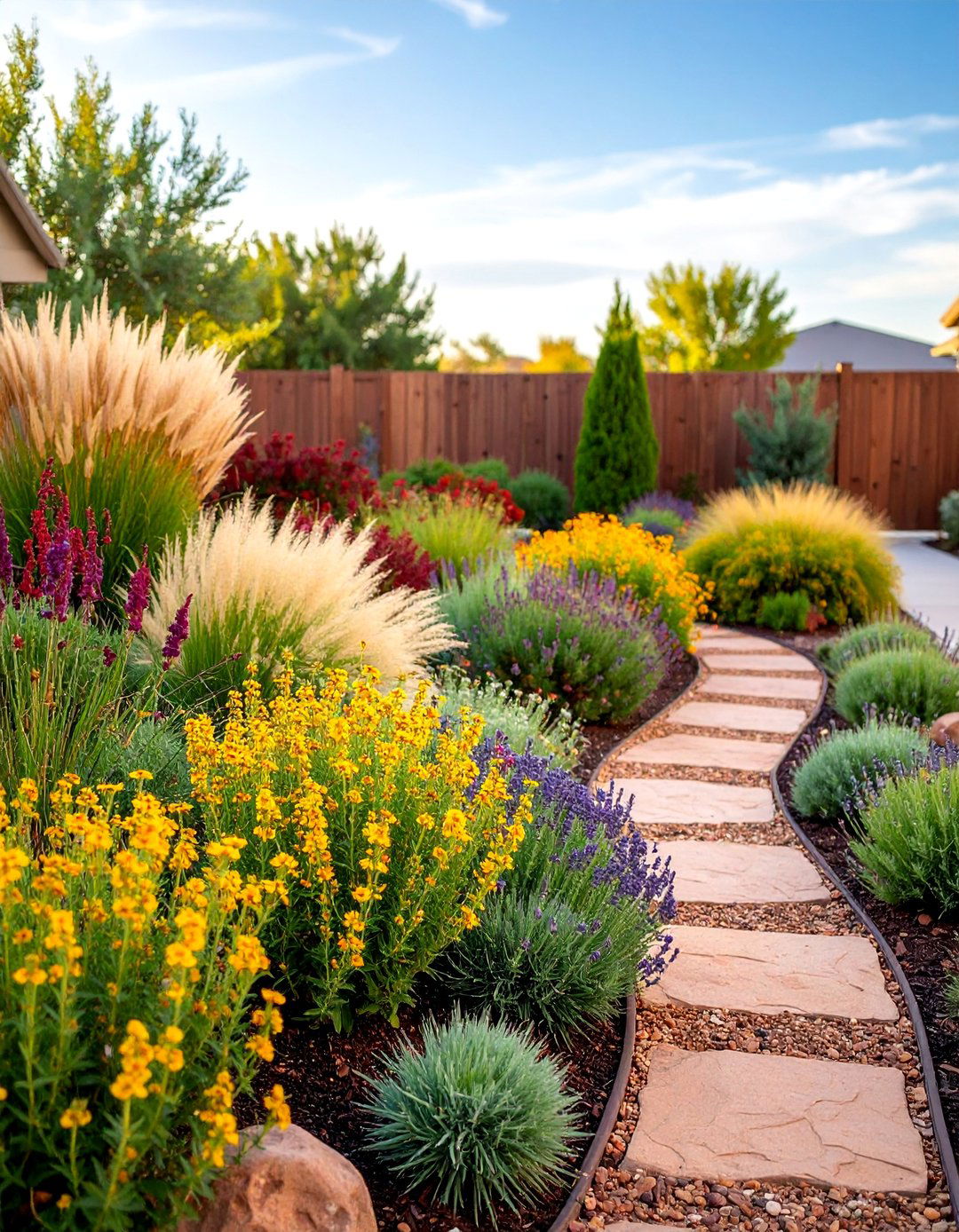
A drought-tolerant native plant garden creates a sustainable, low-maintenance front yard landscape perfectly suited to your local design theme incorporates indigenous grasses, wildflowers, and shrubs that naturally thrive without excessive watering or sedges, ornamental grasses, and region-specific flowering plants form the foundation, while decorative mulch pathways guide visitors to your cohesive color palette features earthy tones with seasonal bursts of native plant placement ensures year-round interest through varying textures, heights, and seasonal changes, creating an eco-friendly landscape that supports local wildlife.
2. Container Garden Oasis

Container garden design transforms small front yards through strategic placement of varied-sized planters creating flexible, moveable landscaping ceramic pots house small trees or substantial shrubs, while medium containers showcase seasonal flowers and trailing urns and modern planters in coordinating colors establish visual continuity across the or decorative stone groundcover unifies the design while providing excellent approach allows seasonal plant rotation, easy maintenance access, and adaptability to changing arrangement creates layers and depth, making compact spaces feel larger through thoughtful vertical and horizontal plant placement.
3. Modern Minimalist Landscape
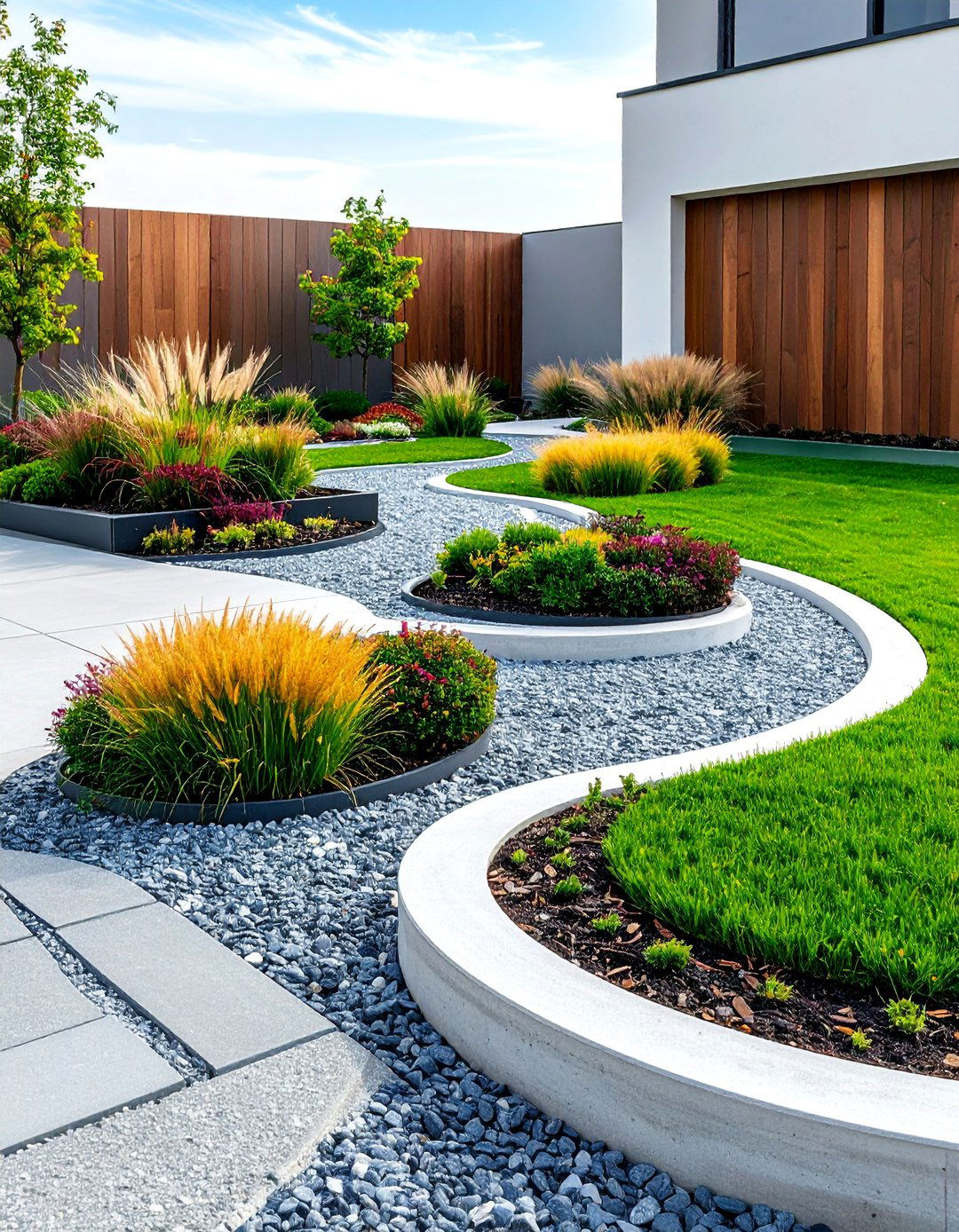
Modern minimalist front yard design emphasizes clean lines, geometric shapes, and carefully selected plant materials for sophisticated planting beds feature single-species groupings of architectural plants like ornamental grasses or succulents, separated by sleek concrete or metal edging. Neutral-colored gravel, decomposed granite, or modern pavers create pathways and ground elements include contemporary planters, linear water features, or sculptural focal color palette focuses on greens, whites, and single accent design requires minimal maintenance while providing maximum visual impact through intentional restraint and thoughtful material selection.
4. Cottage Garden Charm

Cottage garden styling brings romantic, informal beauty to small front yards through abundant flowering plants and traditional design perennial borders overflow with colorful blooms like roses, lavender, delphiniums, and sweet peas creating a naturalistic, slightly wild pathways made from natural stone or brick wind through planted areas, while white picket fencing or low hedges define plants on trellises or arbors add vertical interest and accessories like weathered containers, garden gates, or decorative elements enhance the nostalgic plantings maximize flower power while creating cozy, inviting atmosphere.
5. Japanese Zen Garden
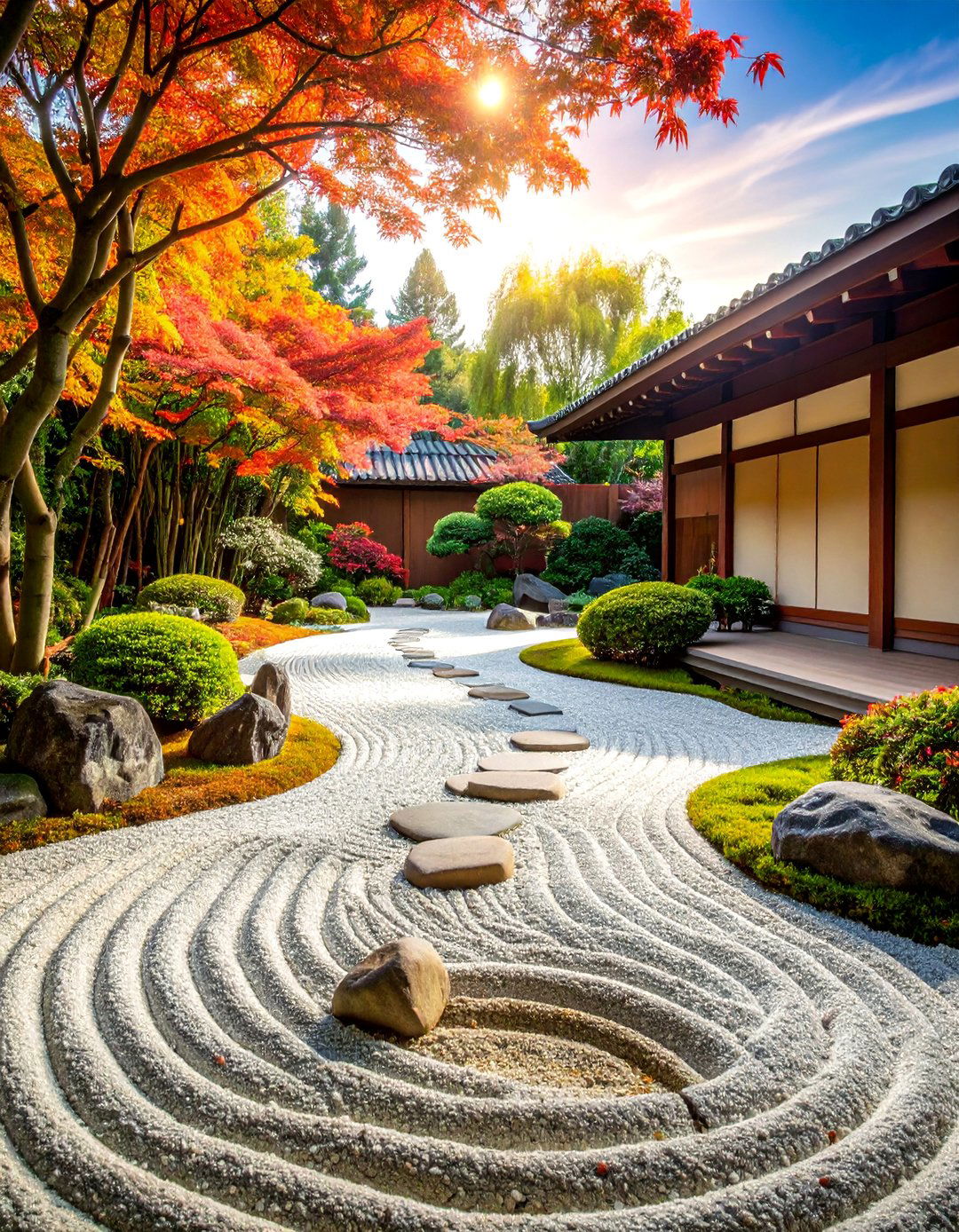
Japanese-inspired zen garden design creates tranquil, meditative front yard spaces emphasizing balance, simplicity, and natural raked gravel or sand areas represent water, while strategically placed rocks symbolize mountains or plant selection focuses on evergreen shrubs, bamboo, and ornamental grasses maintaining year-round structure. A simple stone pathway leads to the entrance, flanked by low-growing mosses or groundcover features like small fountains or stone basins add soothing materials including stone, bamboo, and wood create unified design promotes peaceful reflection while requiring minimal maintenance and seasonal care.
6. Vertical Garden Wall
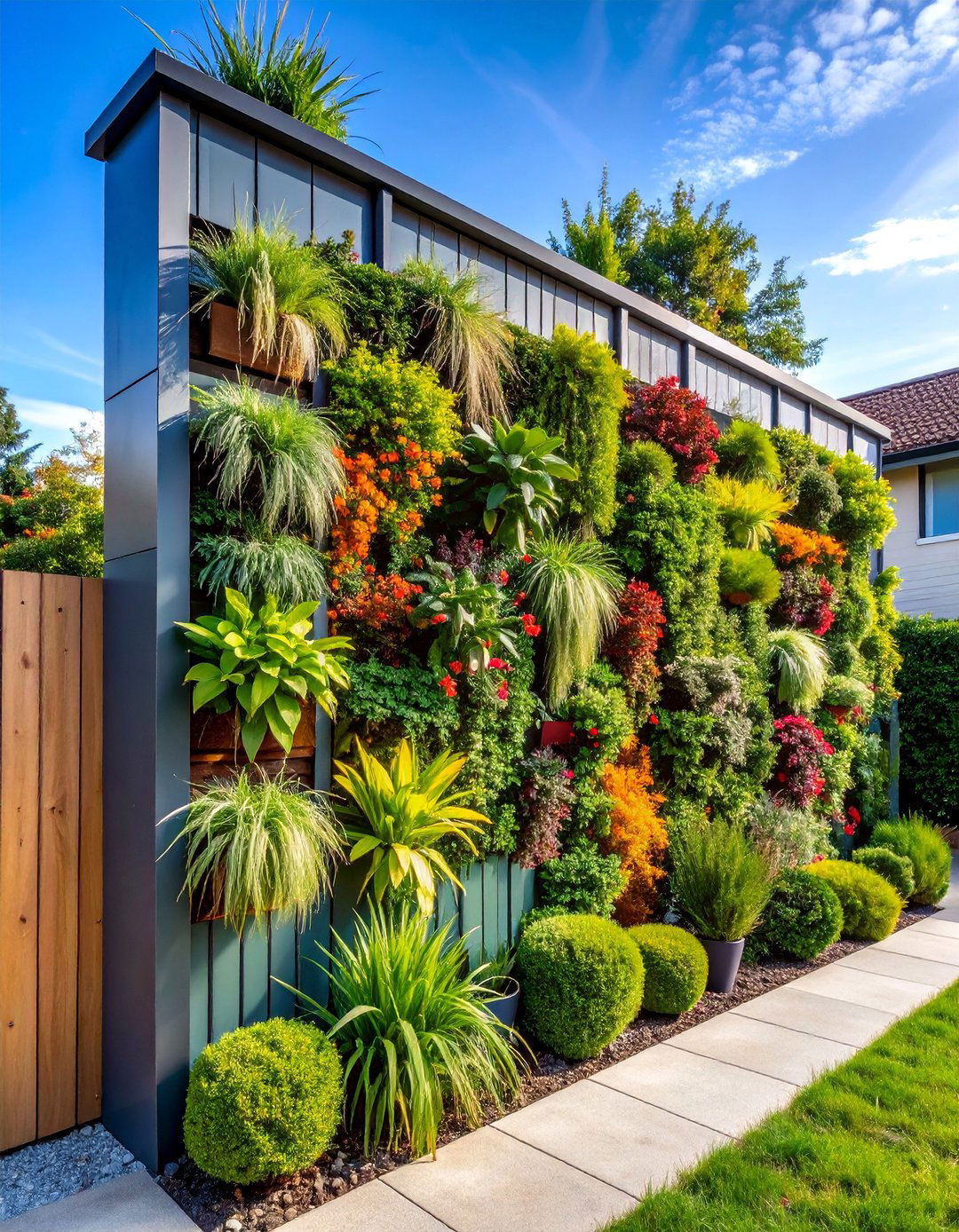
Vertical garden walls maximize growing space in extremely small front yards by utilizing vertical surfaces for plant walls feature modular planting systems attached to fences, building walls, or custom structures supporting diverse plant plants, ferns, succulents, and flowering vines create lush green irrigation systems ensure proper watering, while strategic plant selection considers sun exposure and growing conditions. Ground-level planting beds complement the vertical display with coordinating plants and innovative approach transforms limited square footage into abundant growing space while creating striking architectural features and improving air quality.
7. Mediterranean Courtyard Style
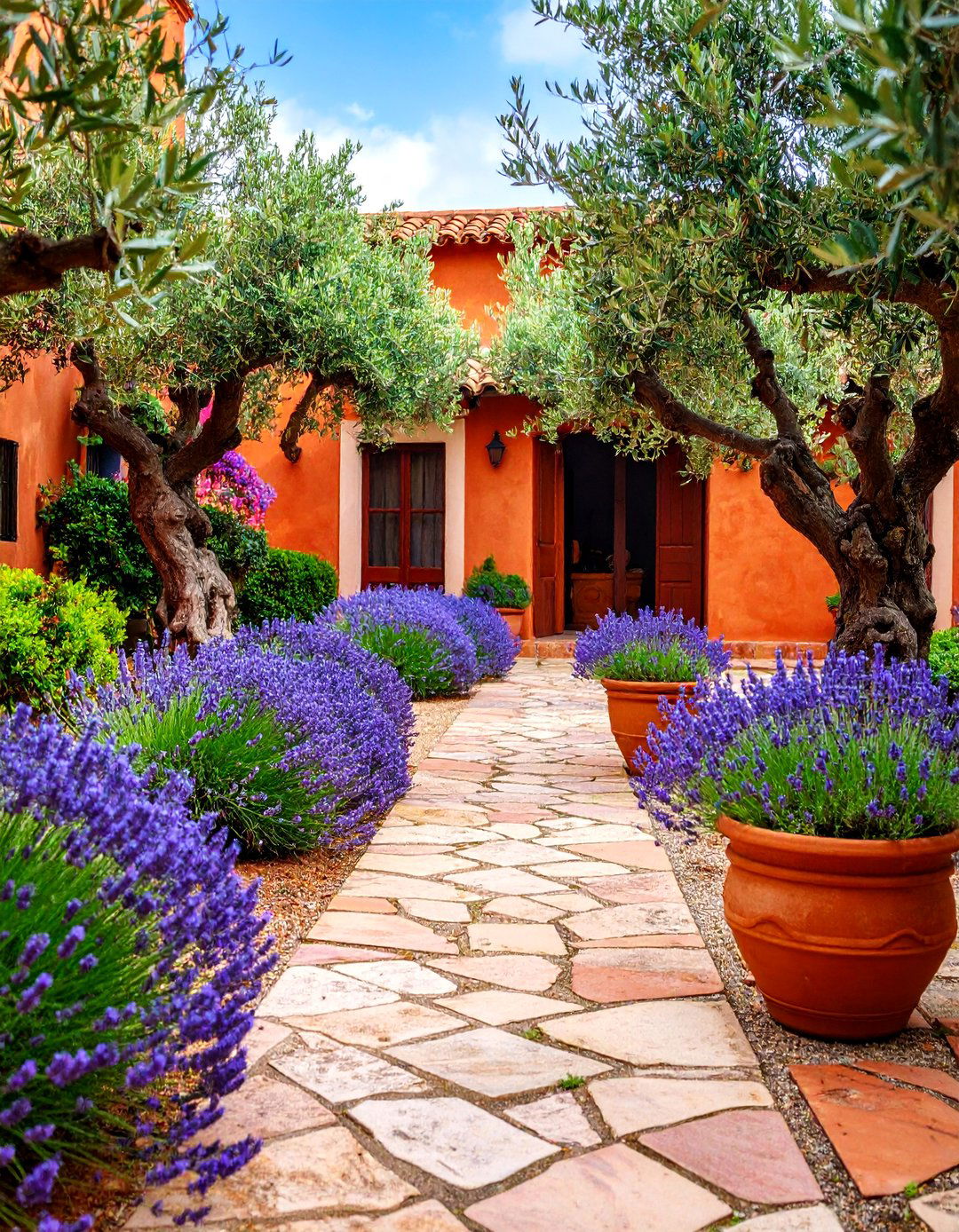
Mediterranean-inspired front yard design evokes warm, coastal elegance through drought-tolerant plants and natural trees, lavender, rosemary, and ornamental grasses create the foundation, while terracotta containers showcase colorful flowering stone pathways and patios provide functional surfaces, complemented by wrought iron decorative elements. Earth-tone color palette includes warm browns, soft grays, and muted pebbles or decomposed granite groundcover reduces maintenance while reflecting Mediterranean use of architectural plants like agaves or Mediterranean fan palms adds structural design thrives in sunny locations while requiring minimal water and maintenance.
8. Woodland Shade Garden
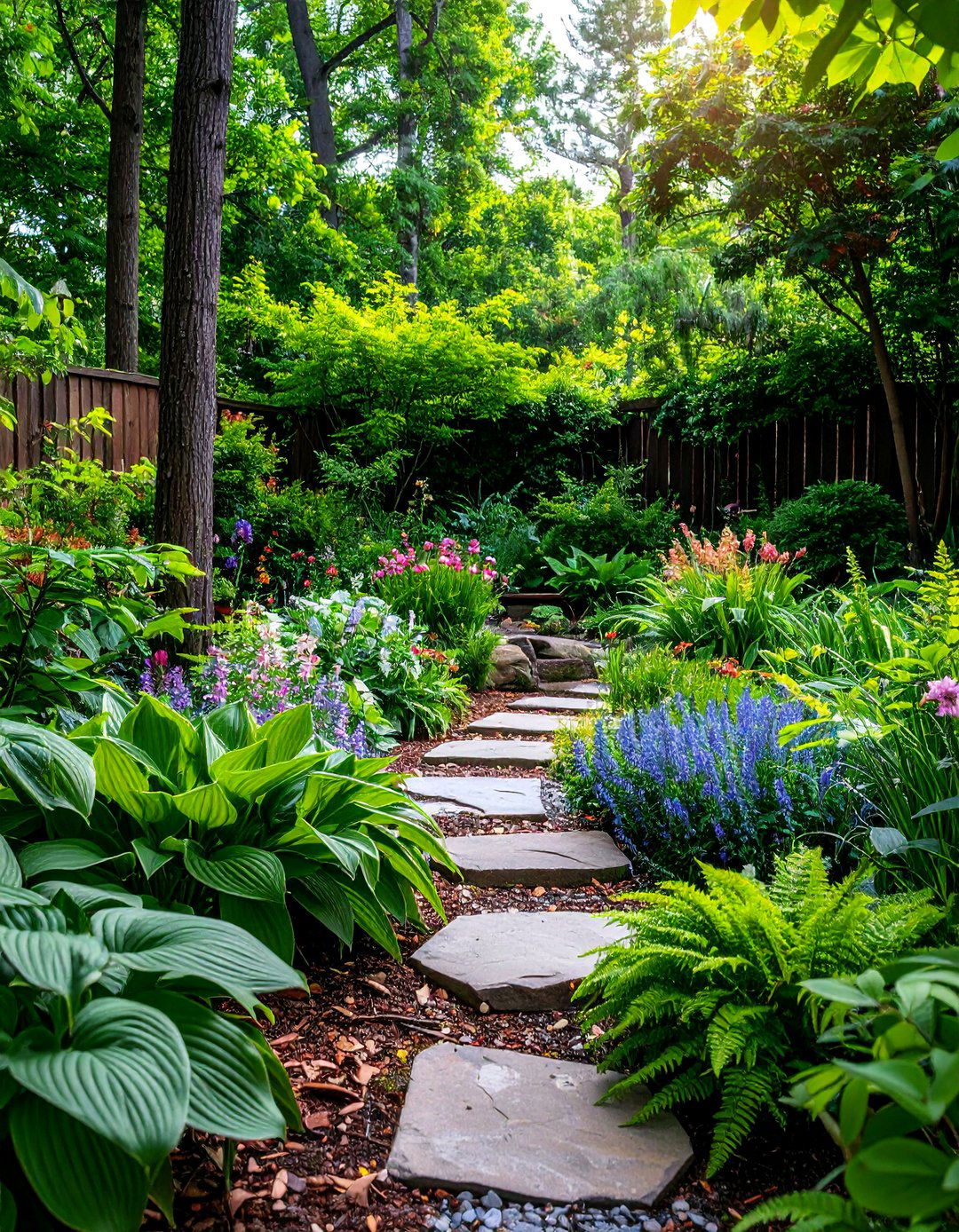
Woodland shade garden design transforms shadowy front yards into lush, forest-like retreats using plants that thrive in low-light plantings include canopy trees, understory shrubs, and ground-level perennials mimicking natural forest ecosystems. Hostas, ferns, astilbe, and native woodland wildflowers create diverse textures and seasonal mulch pathways wind through planted areas, while decorative stones or logs provide seating and visual anchors. Rich, dark soil amendments support healthy plant growth, while strategic lighting enhances evening design celebrates natural beauty while creating cooling microclimates and supporting beneficial insects and birds.
9. Seasonal Color Display Garden
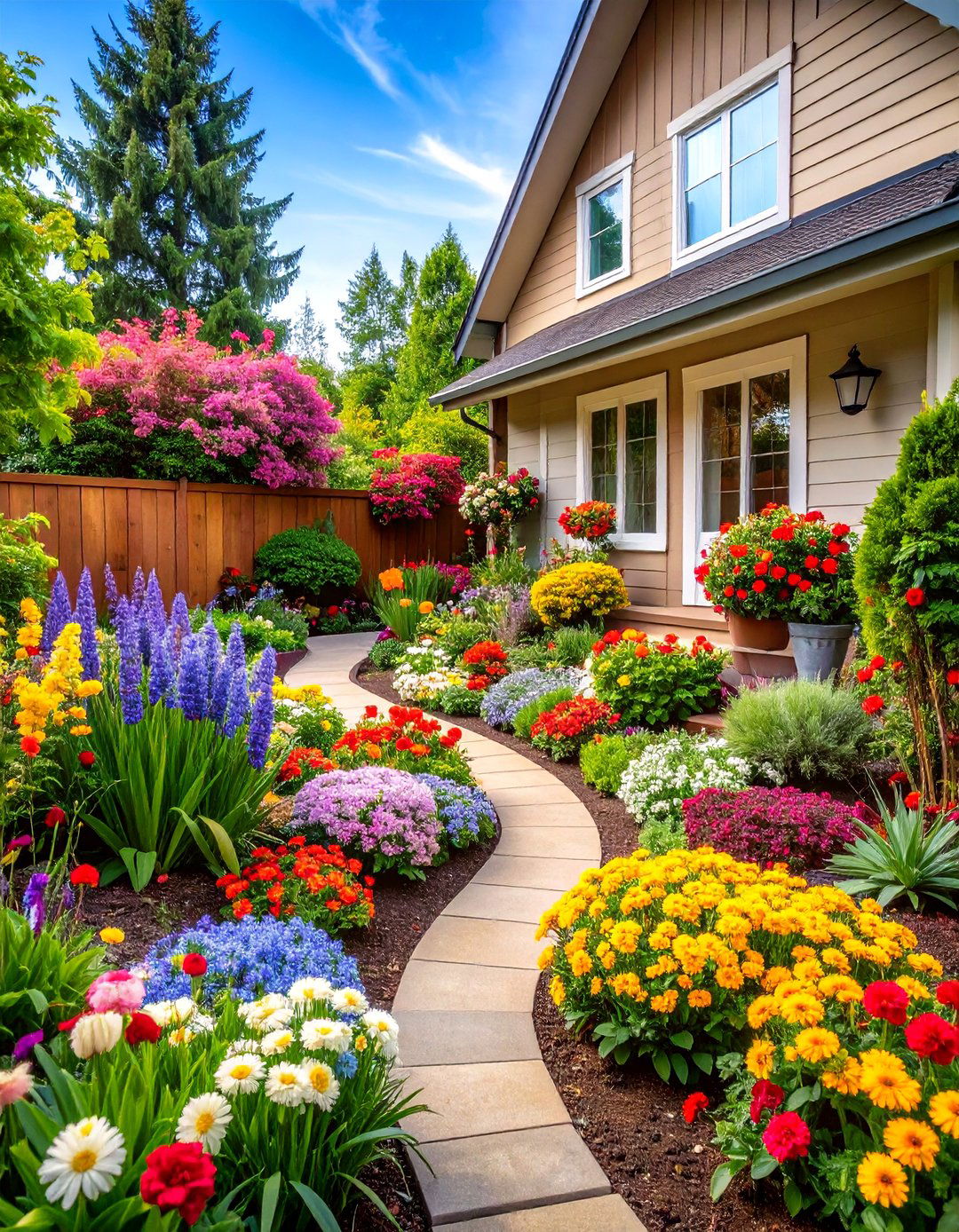
Seasonal color display gardens ensure year-round visual interest through strategic plant selection providing continuous blooming bulbs like tulips and daffodils emerge first, followed by summer annuals and perennials, autumn-blooming flowers, and winter interest plants with colorful bark or evergreen beds organized by bloom time create succession of colors throughout growing structural plants provide consistent framework, while seasonal additions maintain fresh color schemes transition naturally from season to approach requires planning and regular maintenance but rewards with constantly changing, vibrant displays that keep front yards interesting throughout the year.
10. Rock Garden Alpine Design

Rock garden design utilizes natural stone formations and alpine plants to create dramatic landscapes suitable for slopes or well-draining boulders provide structural foundation, while smaller rocks create planting pockets and plants, sedums, creeping thyme, and dwarf conifers thrive in these conditions, requiring minimal water and pathways allow access while maintaining stone colors coordinate with plant selections, creating cohesive earth-tone design works particularly well on challenging terrain, transforming slopes or rocky areas into attractive plant placement ensures four-season interest through varied textures, forms, and subtle color changes.
11. Edible Landscape Garden
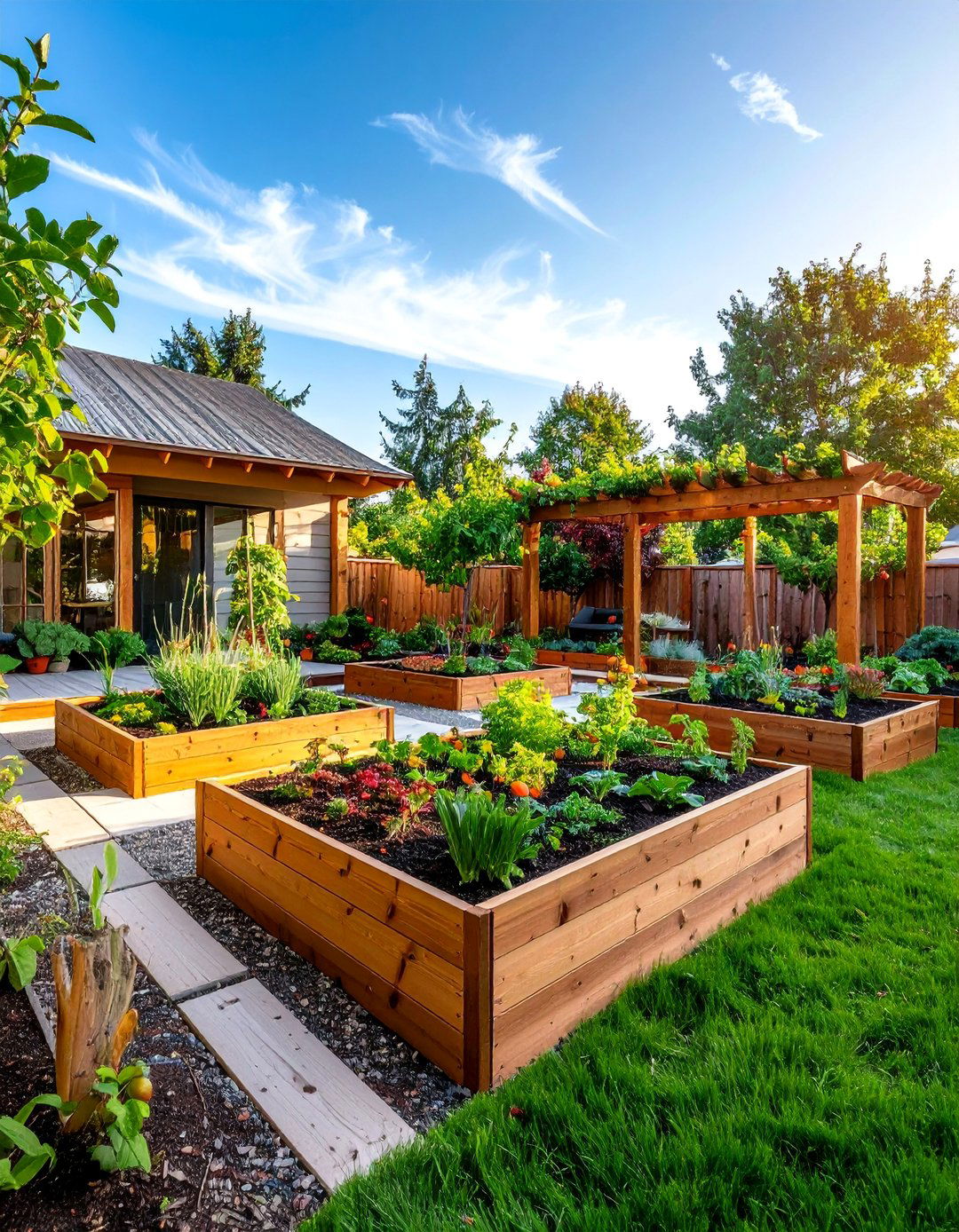
Edible landscape design combines food production with ornamental beauty, creating functional front yards that provide fresh herbs, vegetables, and beds constructed from attractive materials like cedar or stone contain vegetable plantings, while fruit trees or berry bushes provide vertical gardens featuring rosemary, thyme, basil, and sage offer both culinary value and attractive trellises support climbing edibles like peas or planting includes flowers that attract beneficial insects while adding sustainable approach reduces grocery costs while creating conversation-starting landscapes that blend productivity with aesthetic appeal throughout growing seasons.
12. Prairie Grass Meadow
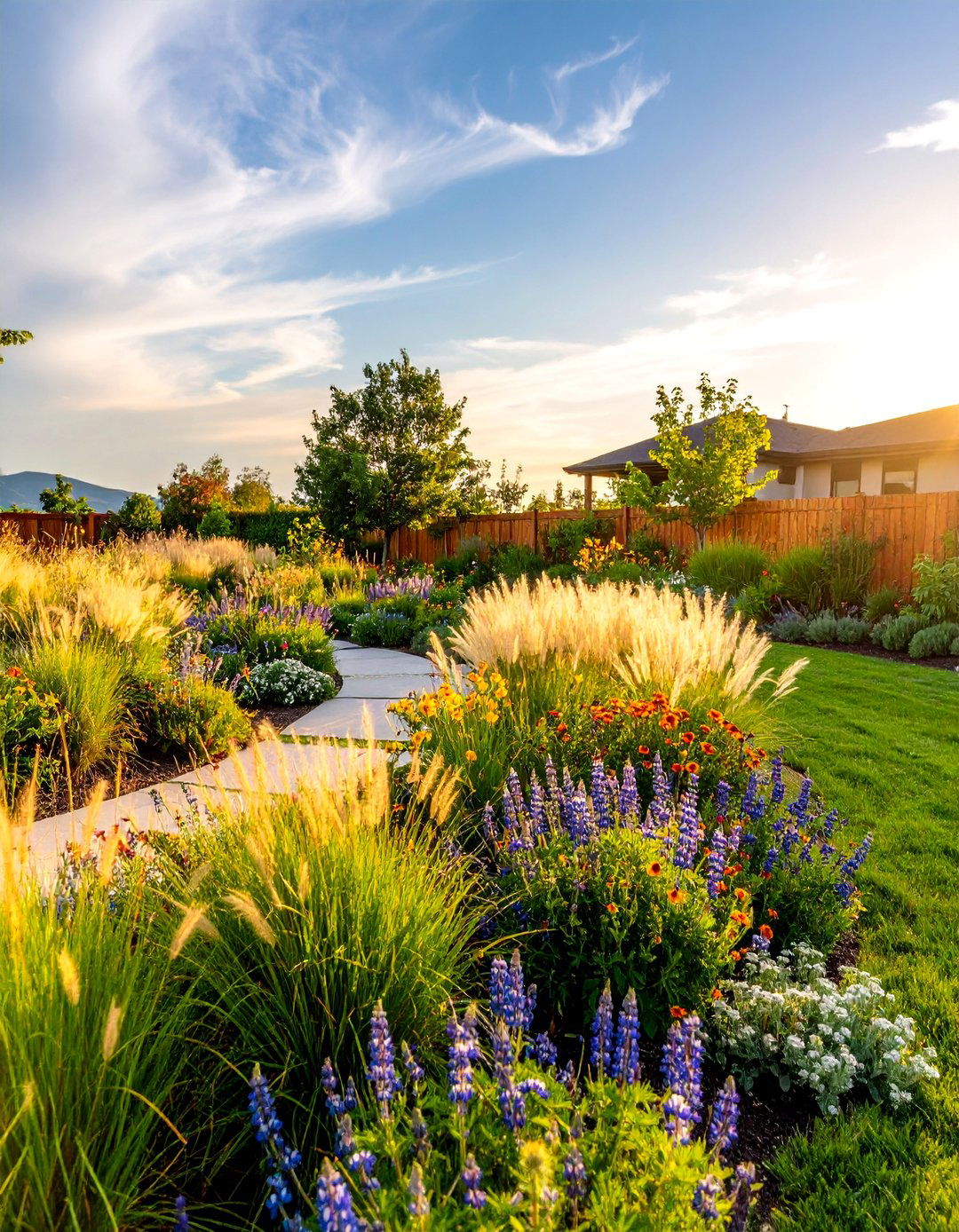
Prairie grass meadow design recreates natural grassland ecosystems through native grasses and wildflowers requiring minimal maintenance once grasses like little bluestem, buffalo grass, and native sedges provide structural foundation, while wildflowers including black-eyed susans, purple coneflowers, and native lupines add seasonal seed head displays extend interest into winter pathways allow access without disturbing natural growth low-water design supports local wildlife while creating dynamic landscapes that change with wind and requires initial investment but rewards with self-sustaining beauty requiring only annual cutting and minimal supplemental watering.
13. Formal Geometric Parterre
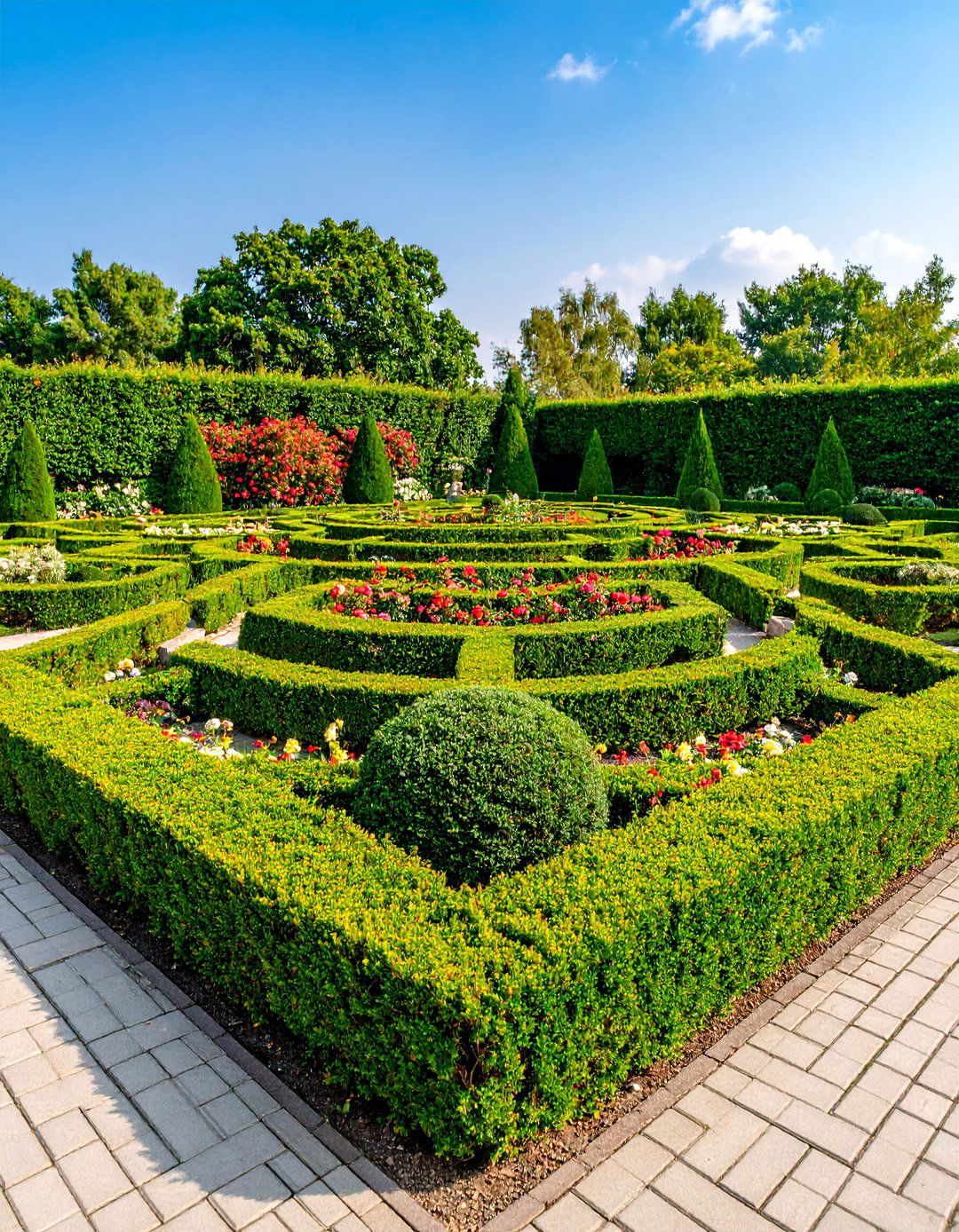
Formal geometric parterre design brings classic elegance to small front yards through structured planting patterns and precise maintenance. Low-growing boxwood hedges create intricate geometric shapes filled with colorful annual flowers or decorative focal points like small fountains, topiary, or sculptural elements anchor the or stone pathways provide access while reinforcing geometric layouts create balance and order, while seasonal flower changes maintain visual design requires regular pruning and maintenance but provides sophisticated, timeless particularly well with traditional architecture styles, creating seamless transitions between formal home facades and landscape elements.
14. Succulent Desert Garden
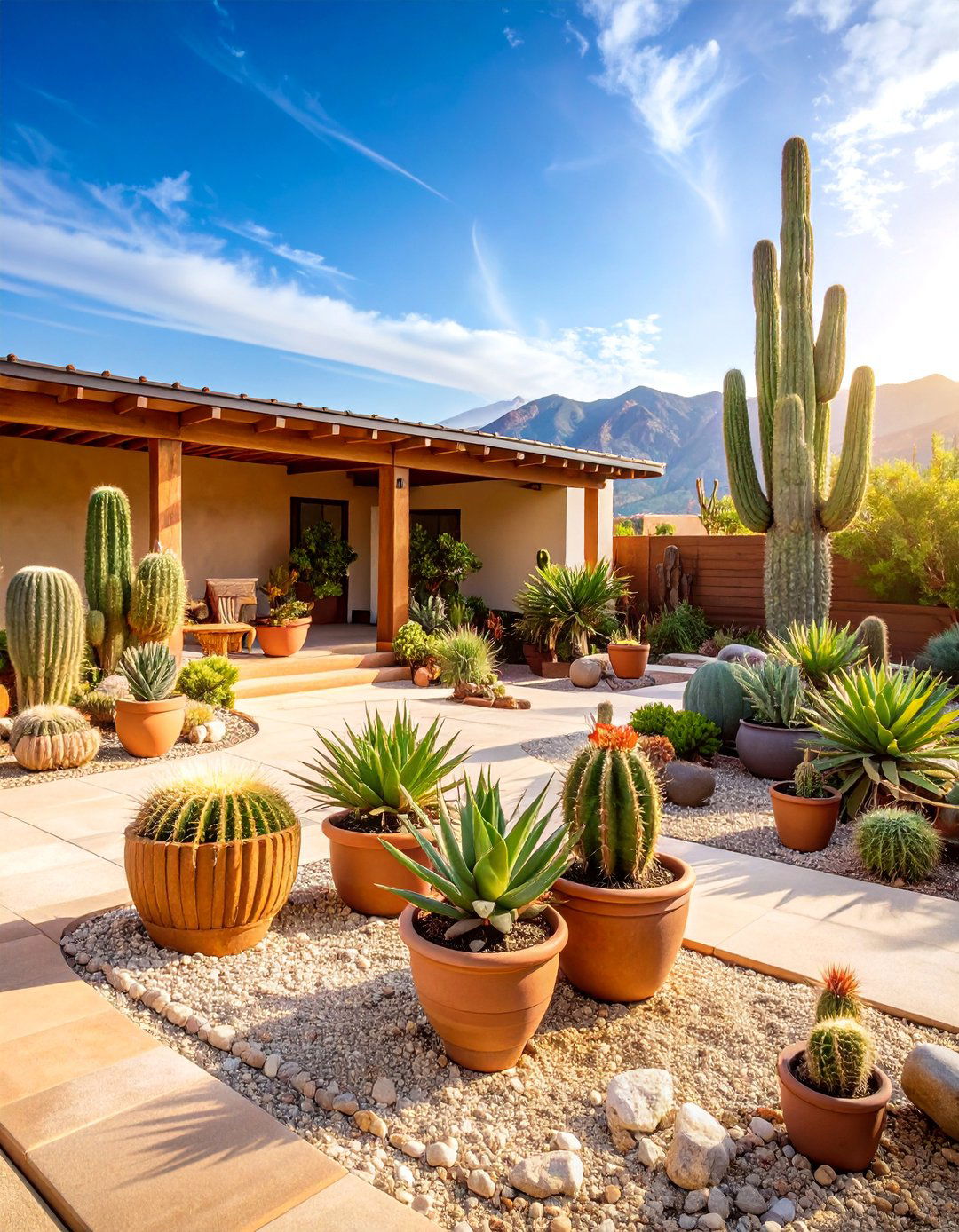
Succulent desert garden design celebrates drought-tolerant plants through diverse collections of architectural succulents and sizes, shapes, and colors create dynamic compositions requiring minimal water and agaves or barrel cacti provide focal points, while smaller sedums, echeverias, and trailing succulents fill planting gravel or decomposed granite groundcover complements plant textures while providing excellent stone accents and modern containers enhance contemporary design thrives in sunny, well-draining locations while providing year-round interest through diverse plant forms and occasional dramatic flowering for water-conscious gardeners seeking low-maintenance beauty.
15. English Perennial Border

English perennial border design creates abundant, cottage-style beauty through carefully orchestrated perennial plant combinations providing continuous seasonal plantings include traditional favorites like delphiniums, peonies, roses, and ornamental grasses arranged by height, bloom time, and color planting beds allow natural, flowing lines while maximizing planting space. Rich, well-amended soil supports healthy plant growth, while strategic spacing allows mature plant care includes deadheading, dividing, and winter design provides cutting garden opportunities while creating romantic, abundant landscapes that improve with age as plants mature and naturalize together.
16. Butterfly and Pollinator Garden
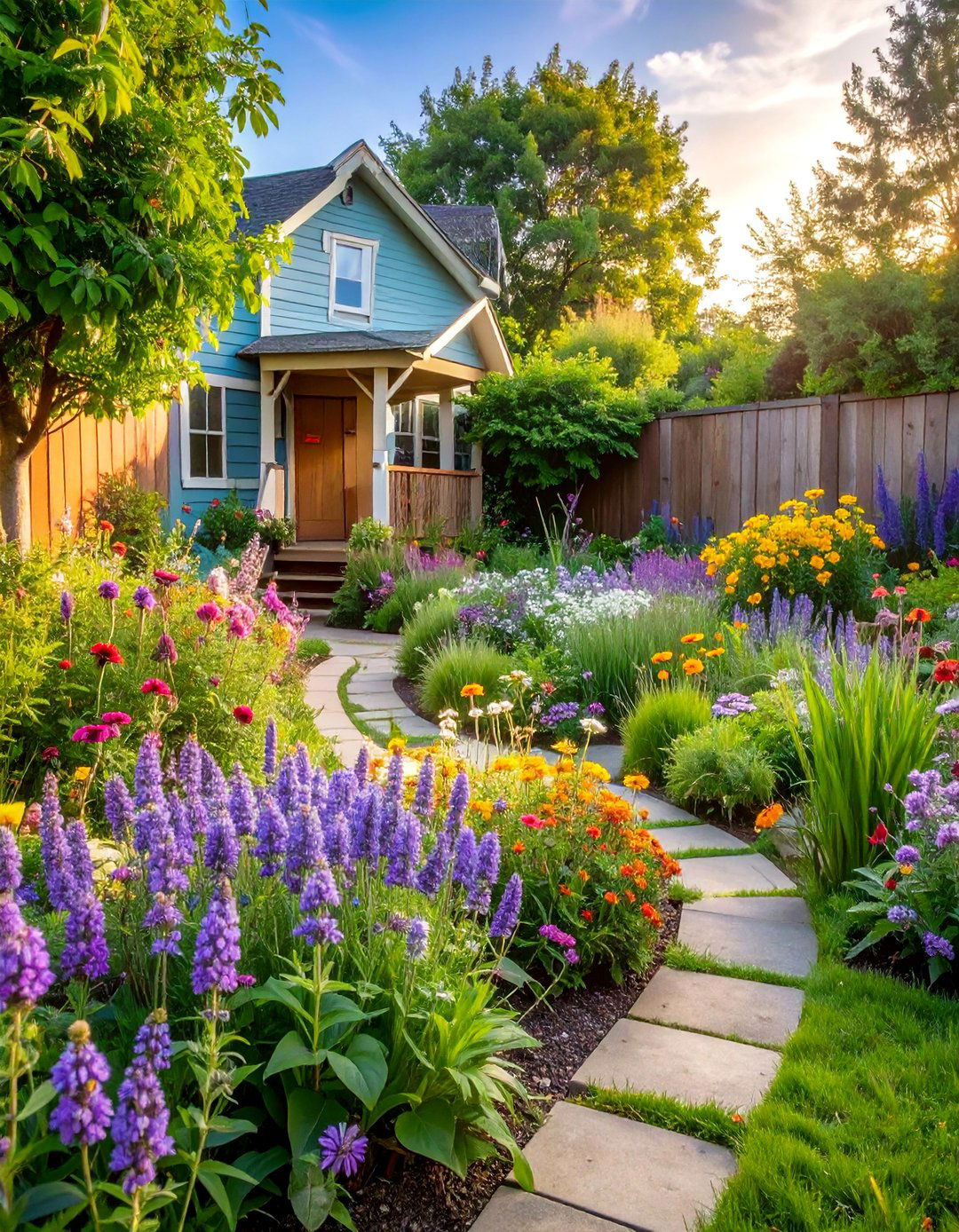
Butterfly and pollinator garden design attracts beneficial insects through native flowering plants providing nectar sources throughout growing selections include bee balm, lavender, native milkweed, coneflowers, and other pollinator-friendly species arranged for continuous blooming water sources and sunny, protected areas support butterfly reproduction and gardening practices eliminate harmful pesticides while encouraging natural pest plantings provide shelter and overwintering sites for beneficial environmentally conscious design supports local ecosystems while creating colorful, dynamic landscapes that buzz with activity throughout growing opportunities arise from observing pollinator behavior and life cycles.
17. Tropical Paradise Garden
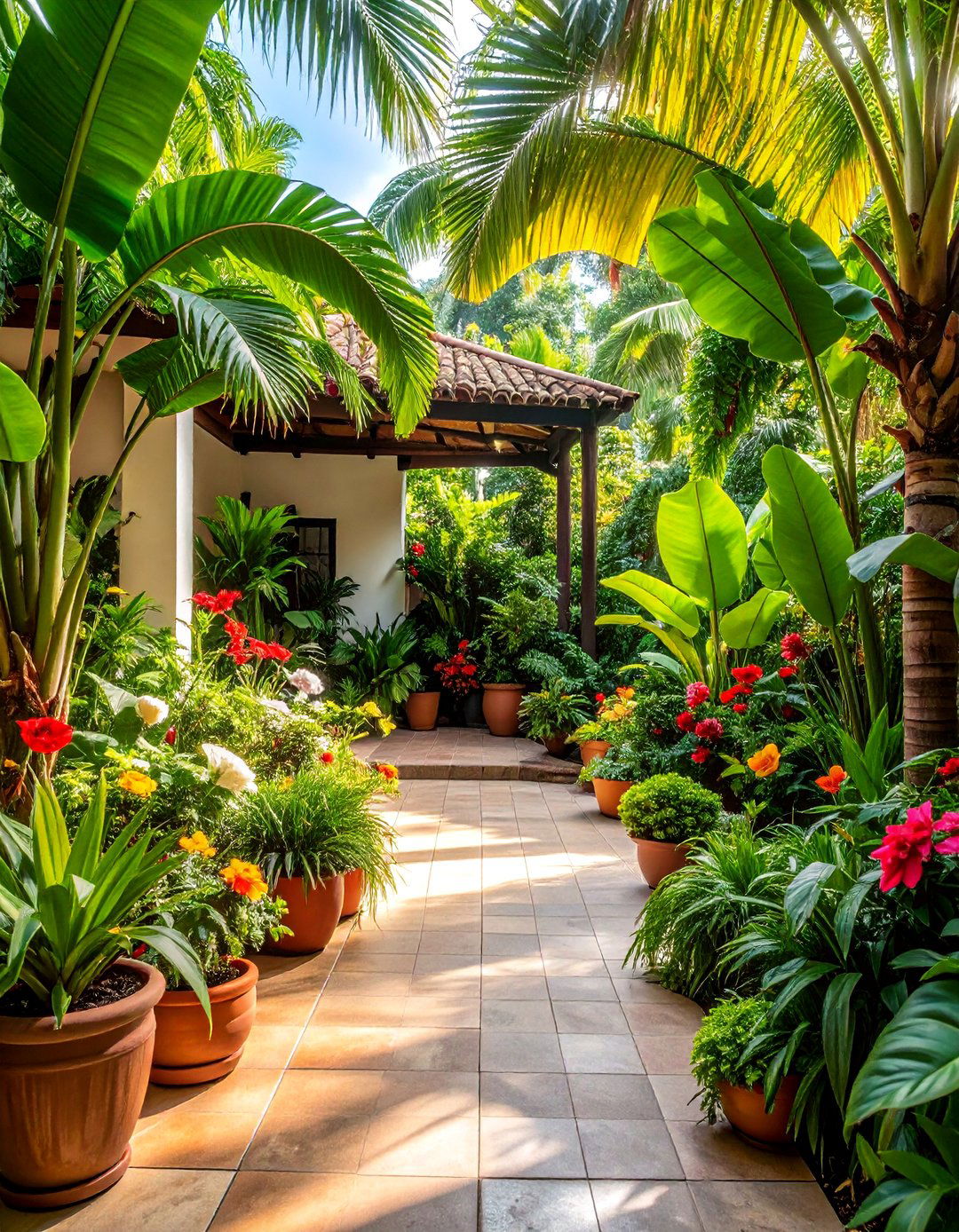
Tropical paradise garden design brings exotic beauty to small front yards through lush foliage plants and vibrant flowering species creating resort-like atmospheres. Large-leafed plants like elephant ears, cannas, and tropical hibiscus provide dramatic backdrops, while colorful crotons, bromeliads, and flowering vines add exotic trees or banana plants create vertical structure and shade. Rich, organic soil and consistent moisture support vigorous containers allow tender plants to be moved indoors during winter months in colder color palettes featuring reds, oranges, and bright greens create energizing, vacation-inspired landscapes that transform ordinary front yards into extraordinary tropical retreats.
18. Monochromatic Color Scheme

Monochromatic color scheme design creates sophisticated unity through single-color plant palettes explored in various shades, tints, and gardens feature plants with white flowers, silver foliage, and green accents creating elegant, peaceful schemes incorporate lavender, delphiniums, and blue-gray foliage diversity comes through varied textures, sizes, and bloom times within the chosen color use of different materials like white gravel, gray stone, or colored mulch reinforces color refined approach creates calming, cohesive landscapes that photograph beautifully while providing sophisticated design particularly well with specific architectural styles or personal color preferences.
19. Four-Season Interest Garden
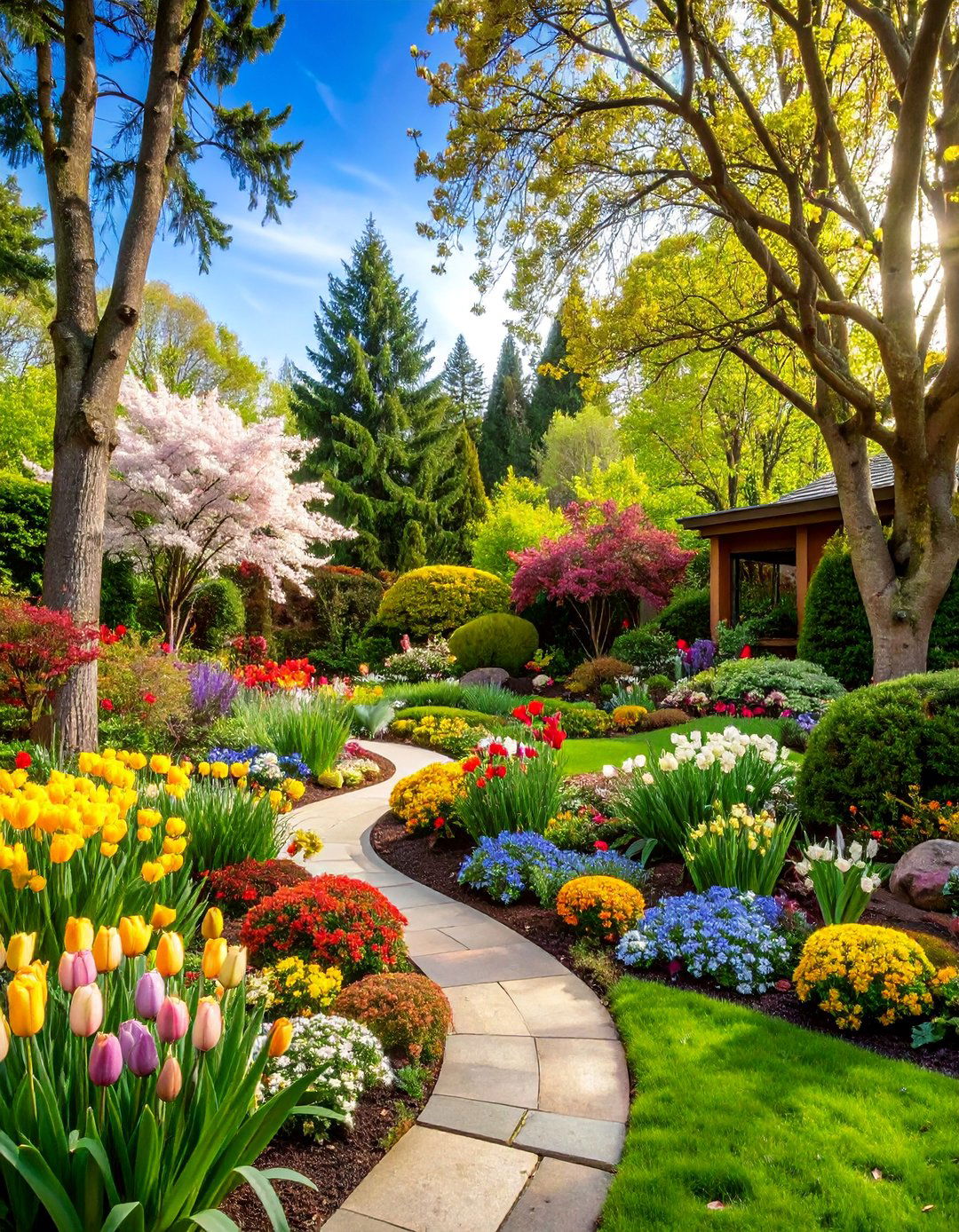
Four-season interest garden design ensures year-round beauty through strategic plant combinations providing visual appeal during every features include early bulbs and flowering trees, summer showcases perennial blooms and lush foliage, autumn brings colorful leaf changes and late-flowering plants, while winter interest comes from evergreen plants, interesting bark, and seed elements like decorative fencing, pathways, and garden art provide consistent visual selections consider bloom times, foliage colors, winter forms, and seasonal comprehensive approach requires careful planning but rewards with landscapes that remain attractive and engaging throughout entire years, regardless of weather conditions.
20. Water-Wise Xerophyte Garden

Water-wise xerophyte garden design showcases drought-tolerant plants from arid regions worldwide, creating sustainable landscapes requiring minimal irrigation once collections include Mediterranean herbs, South African succulents, Australian natives, and North American desert plants arranged by water needs and growing mulch and decomposed granite pathways provide excellent drainage while reducing irrigation systems deliver water efficiently when stone features and sculptural plants create focal points and architectural environmentally responsible design reduces water consumption while providing unique, educational landscapes showcasing plant adaptations to challenging growing conditions.
21. Cottage Garden Herb Spiral
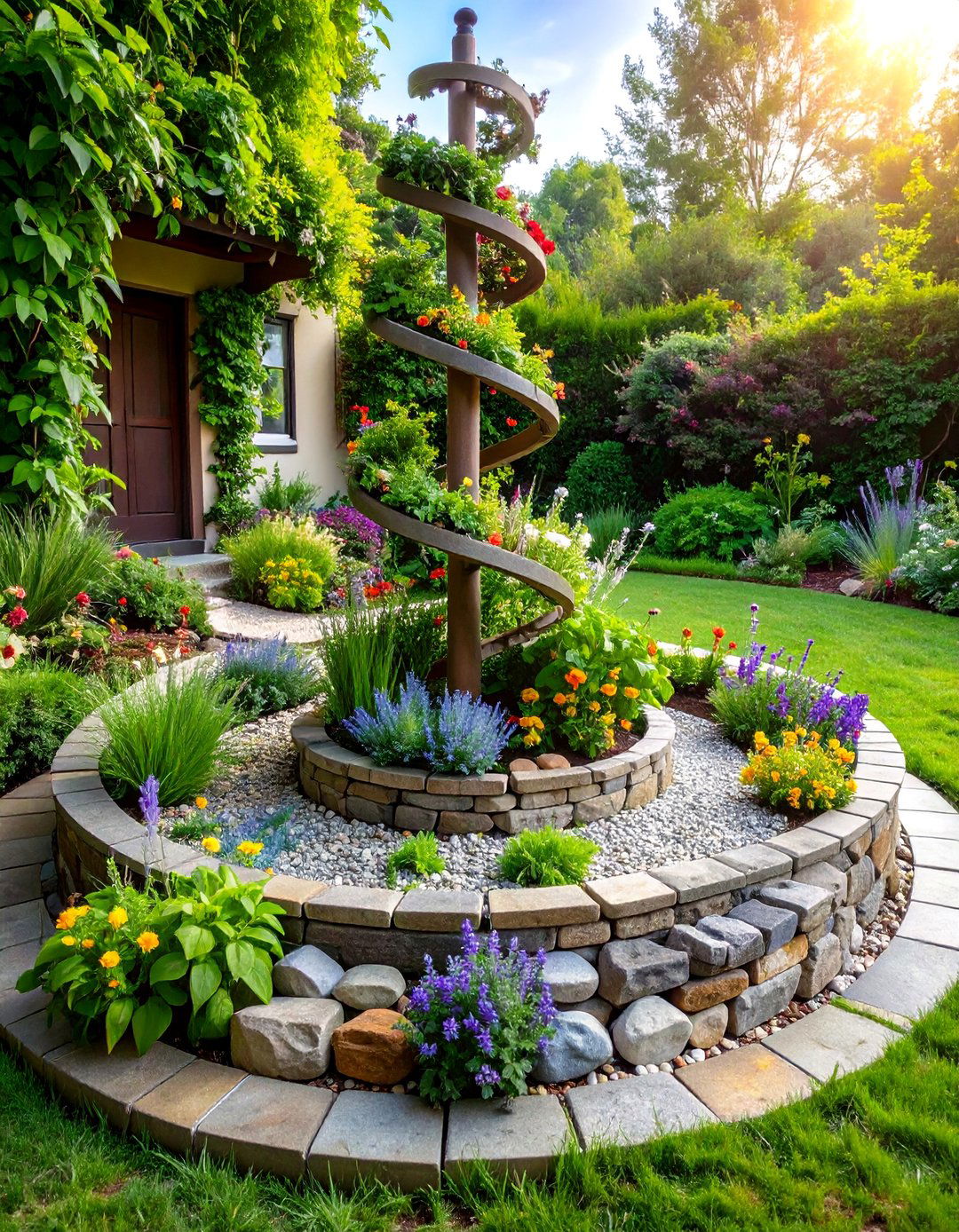
Cottage garden herb spiral design combines functional herb growing with attractive landscape features through raised spiral planting beds maximizing growing space and creating or brick construction creates ascending spiral paths allowing different drainage and sun exposure levels for diverse herb herbs like rosemary and thyme occupy sunny, well-draining upper areas, while moisture-loving herbs like mint and parsley grow in lower, shadier flowers attract beneficial insects while adding permaculture-inspired design provides fresh culinary herbs while creating attractive, functional landscape features that serve as conversation pieces and demonstrate sustainable gardening principles.
22. Contemporary Architectural Garden

Contemporary architectural garden design emphasizes geometric forms, modern materials, and structural plants creating sleek, sophisticated landscapes complementing modern home styles. Clean-lined planting beds feature architectural plants like ornamental grasses, bamboo, or sculptural succulents arranged in geometric materials including cor-ten steel, concrete, and glass create hardscape elements and plant color palettes focus on greens, whites, and single accent lighting systems highlight plant textures and architectural design approach creates seamless indoor-outdoor connections while requiring minimal plant selections provide four-season interest through structural forms rather than seasonal flower displays.
23. Wildflower Meadow Garden

Wildflower meadow garden design recreates natural prairies through diverse native wildflower and grass combinations requiring minimal maintenance once mixtures appropriate to local growing conditions create naturalistic displays changing throughout growing pathways provide access while maintaining natural wildflowers provide quick color while perennial species establish long-term low-cost approach supports local wildlife including birds, butterflies, and beneficial management includes annual mowing and occasional works particularly well on slopes or challenging terrain where traditional landscaping proves habitat corridors while reducing maintenance requirements and supporting biodiversity.
24. Fragrance Garden Sanctuary
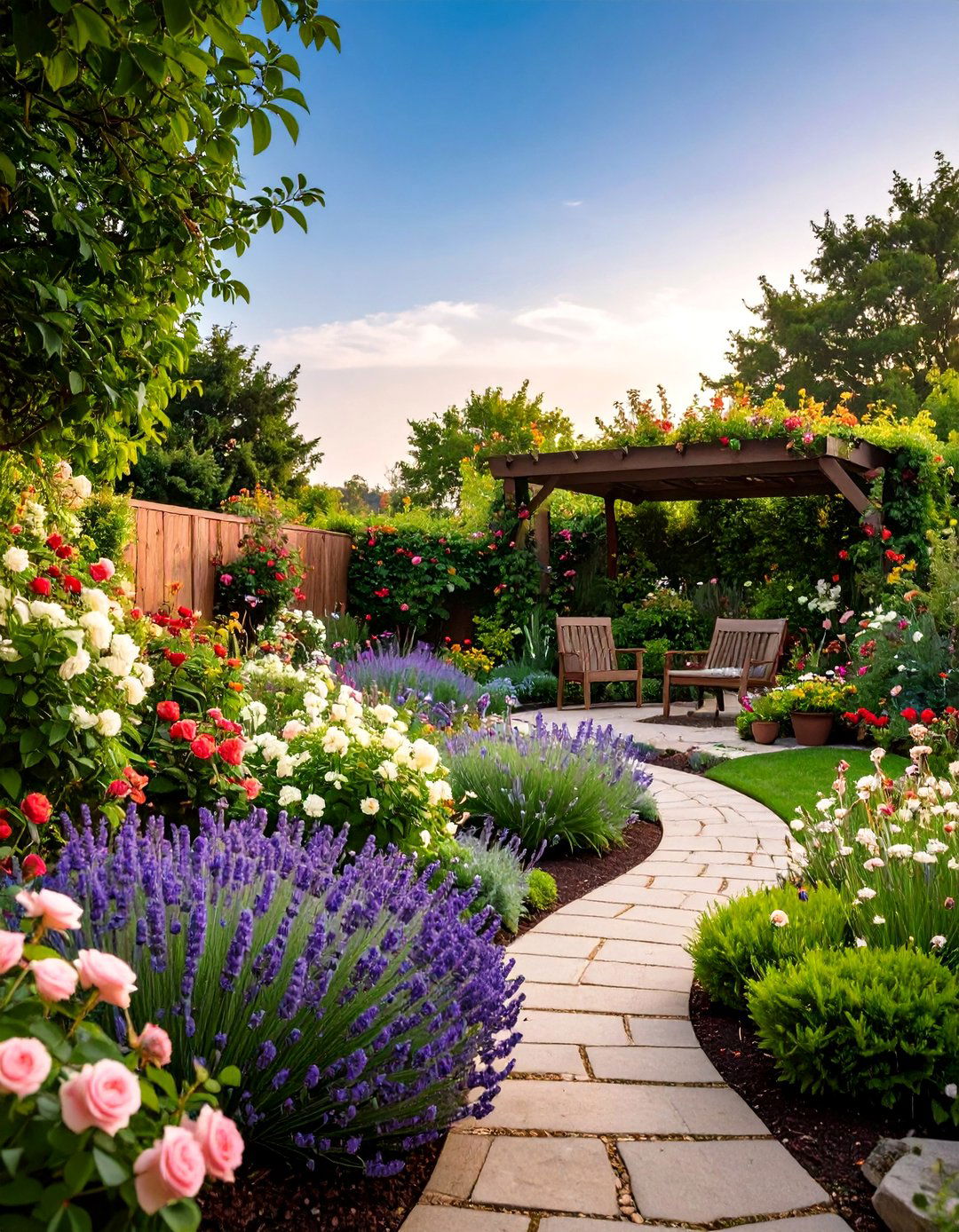
Fragrance garden design prioritizes aromatic plants creating sensory-rich landscapes appealing to smell as well as plant selections include fragrant flowers like gardenias, jasmine, and sweet alyssum, plus aromatic foliage plants like lavender, rosemary, and scented placement near walkways and seating areas maximizes fragrance enjoyment. Evening-blooming plants like night-blooming jasmine extend aromatic experiences into nighttime gardens provide culinary fragrances, while rose gardens offer classic floral design creates therapeutic, relaxing environments while providing cut flowers and herbs for indoor valuable for people with visual impairments who rely on other senses for garden enjoyment.
25. Low-Maintenance Evergreen Garden
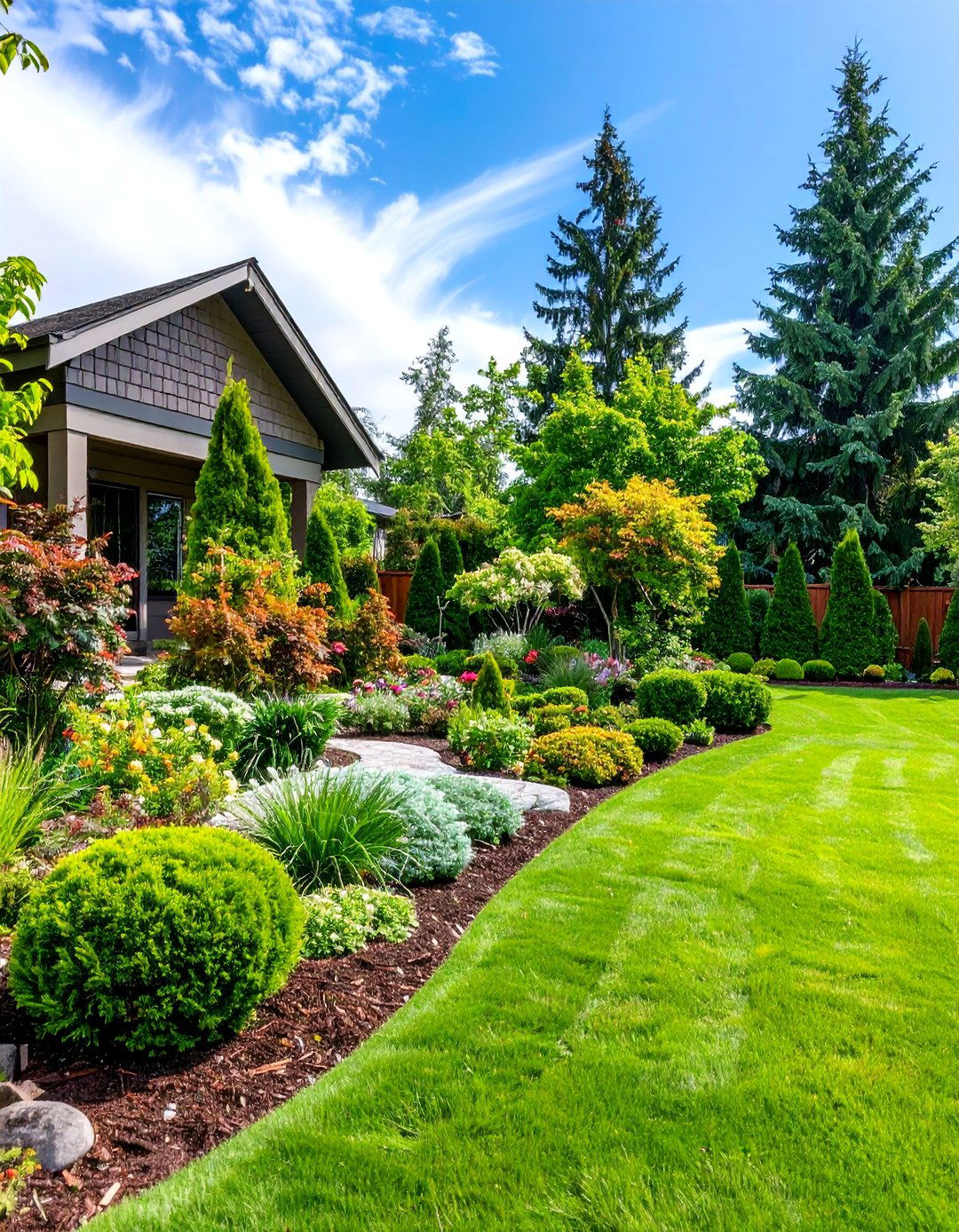
Low-maintenance evergreen garden design provides year-round color and structure through carefully selected coniferous and broad-leafed evergreen plants requiring minimal seasonal conifers, evergreen shrubs, and groundcover plants create layered compositions maintaining consistent appearances regardless of selections consider mature sizes, growth rates, and maintenance planting beds suppress weeds while retaining soil design approach works well for busy homeowners or vacation properties requiring attractive landscapes without intensive use of different evergreen textures, colors, and forms creates visual interest without seasonal plant privacy screening and noise reduction while supporting birds year-round.
Conclusion:
Small front yard landscaping offers endless possibilities for creating beautiful, functional outdoor spaces regardless of size 25 design ideas demonstrate how thoughtful plant selection, creative use of space, and strategic design principles transform compact areas into stunning landscape preferring low-maintenance solutions, seasonal color displays, or specialty themes, successful small front yard landscaping balances personal preferences with practical considerations while enhancing curb appeal and property value.


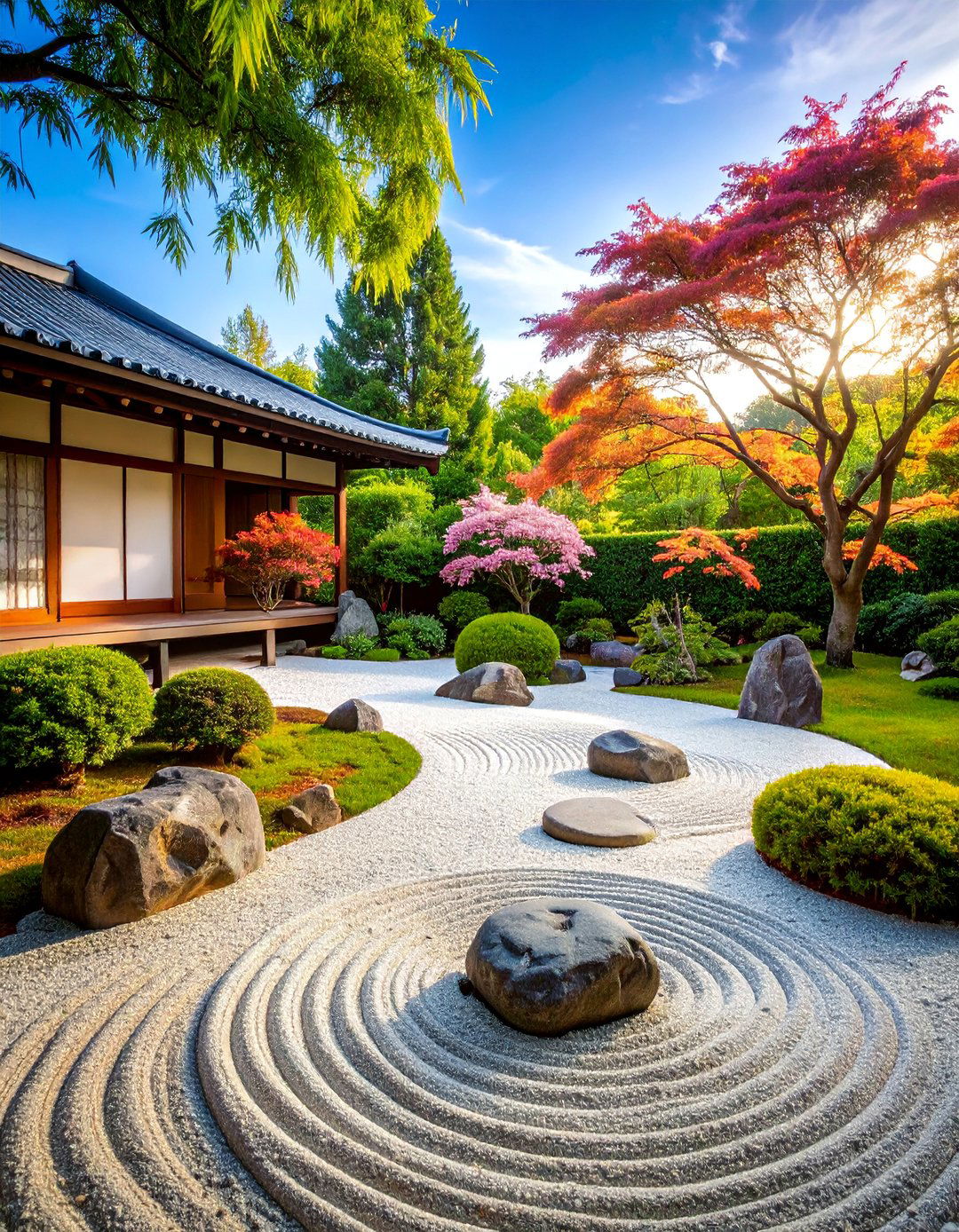





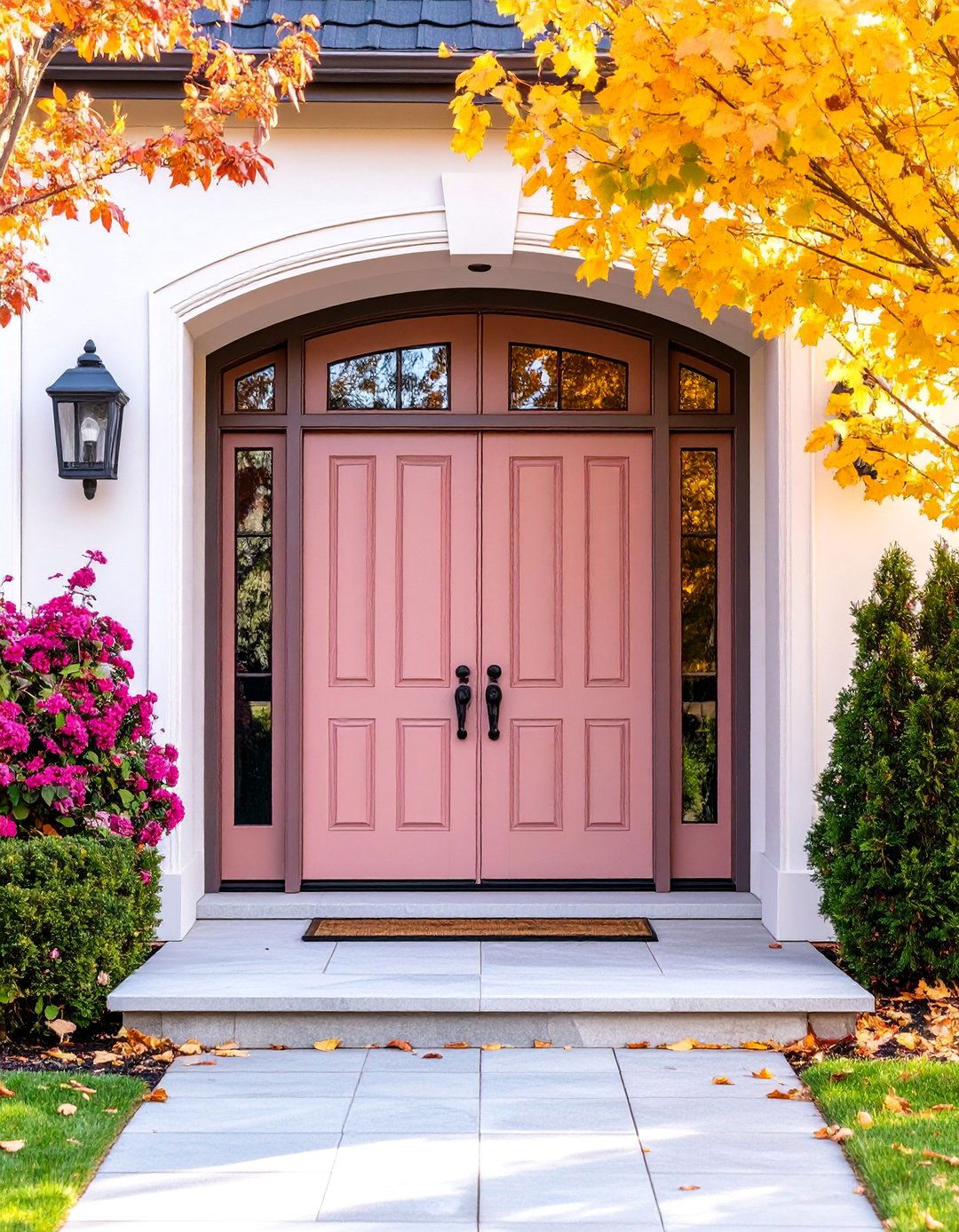


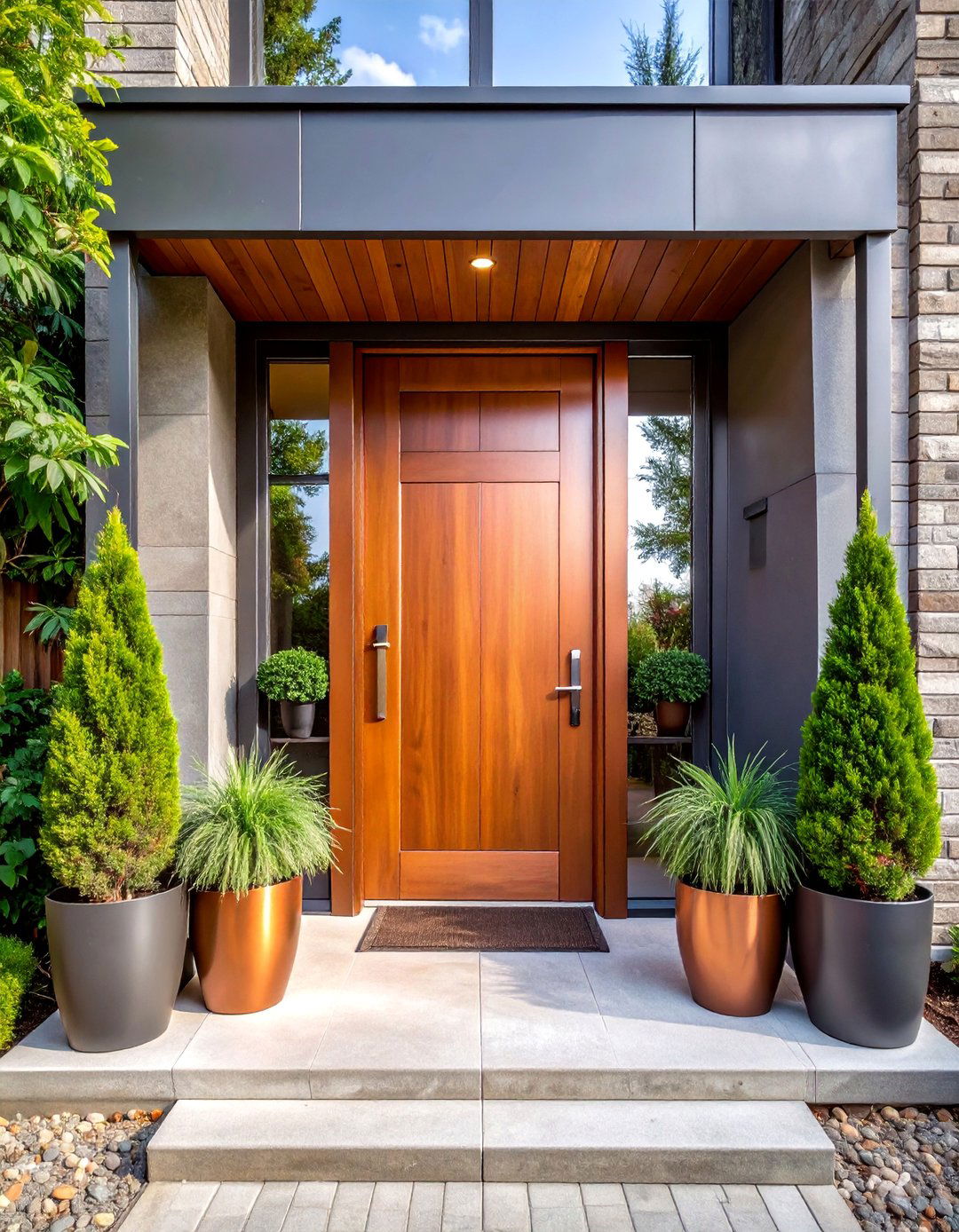
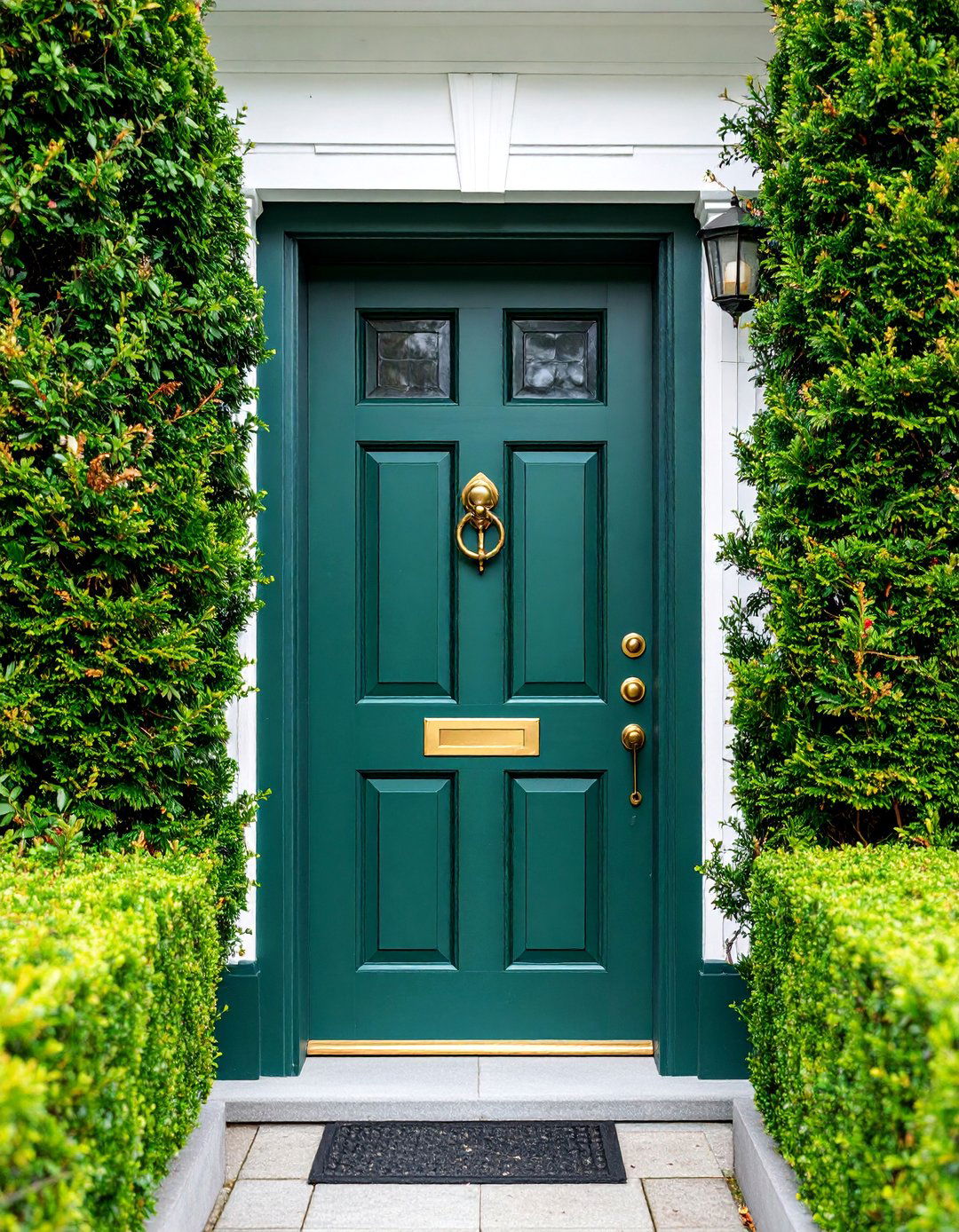

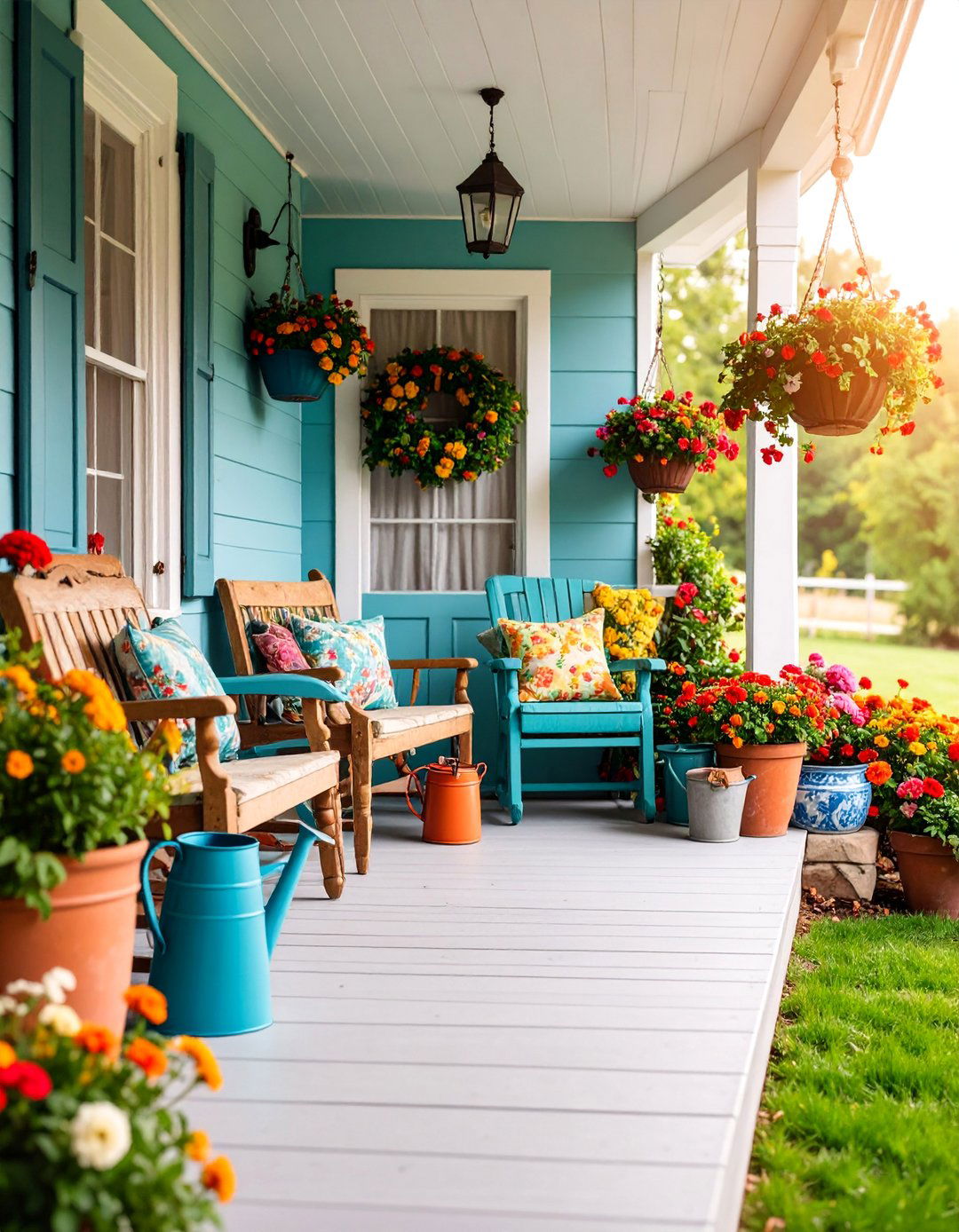
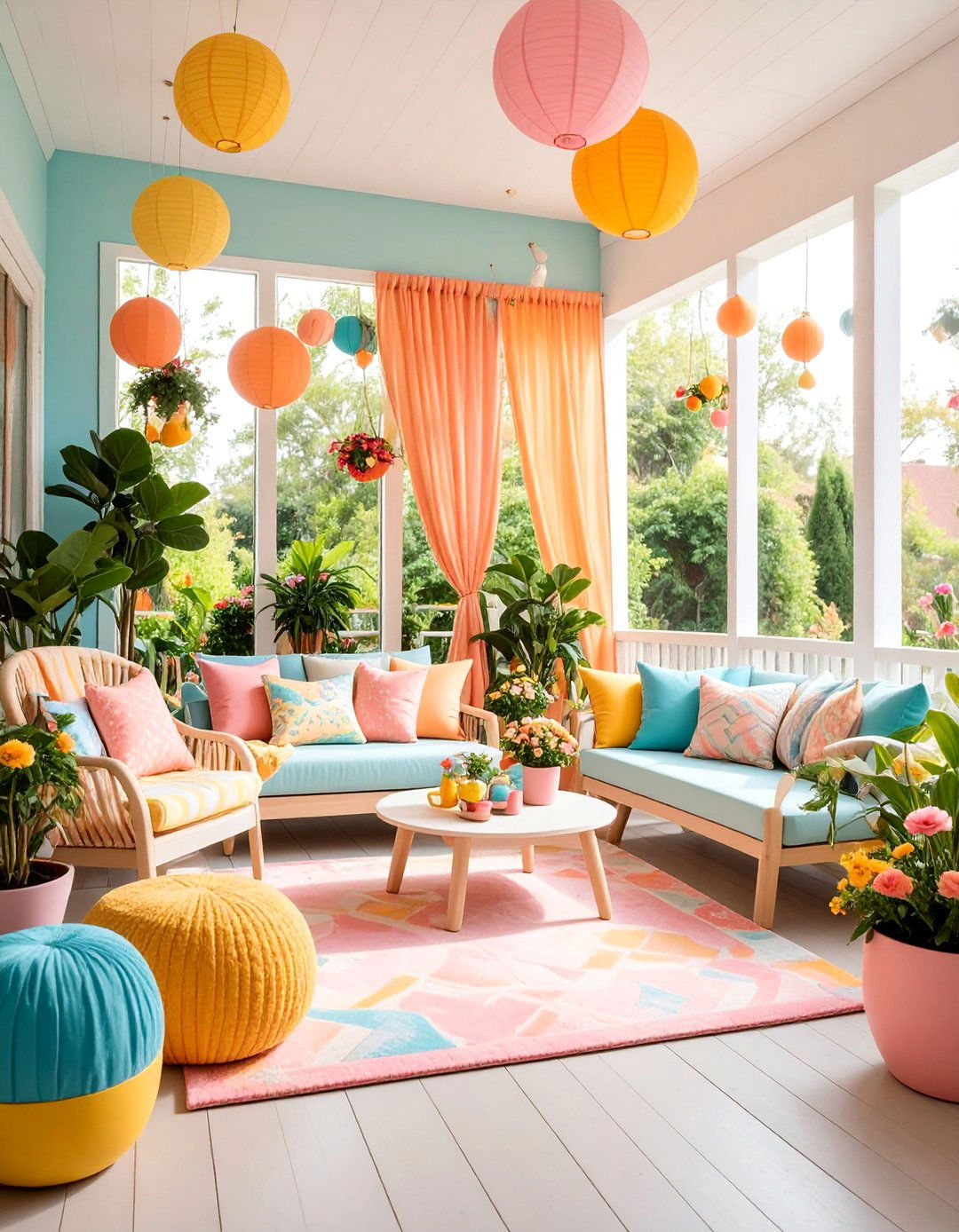
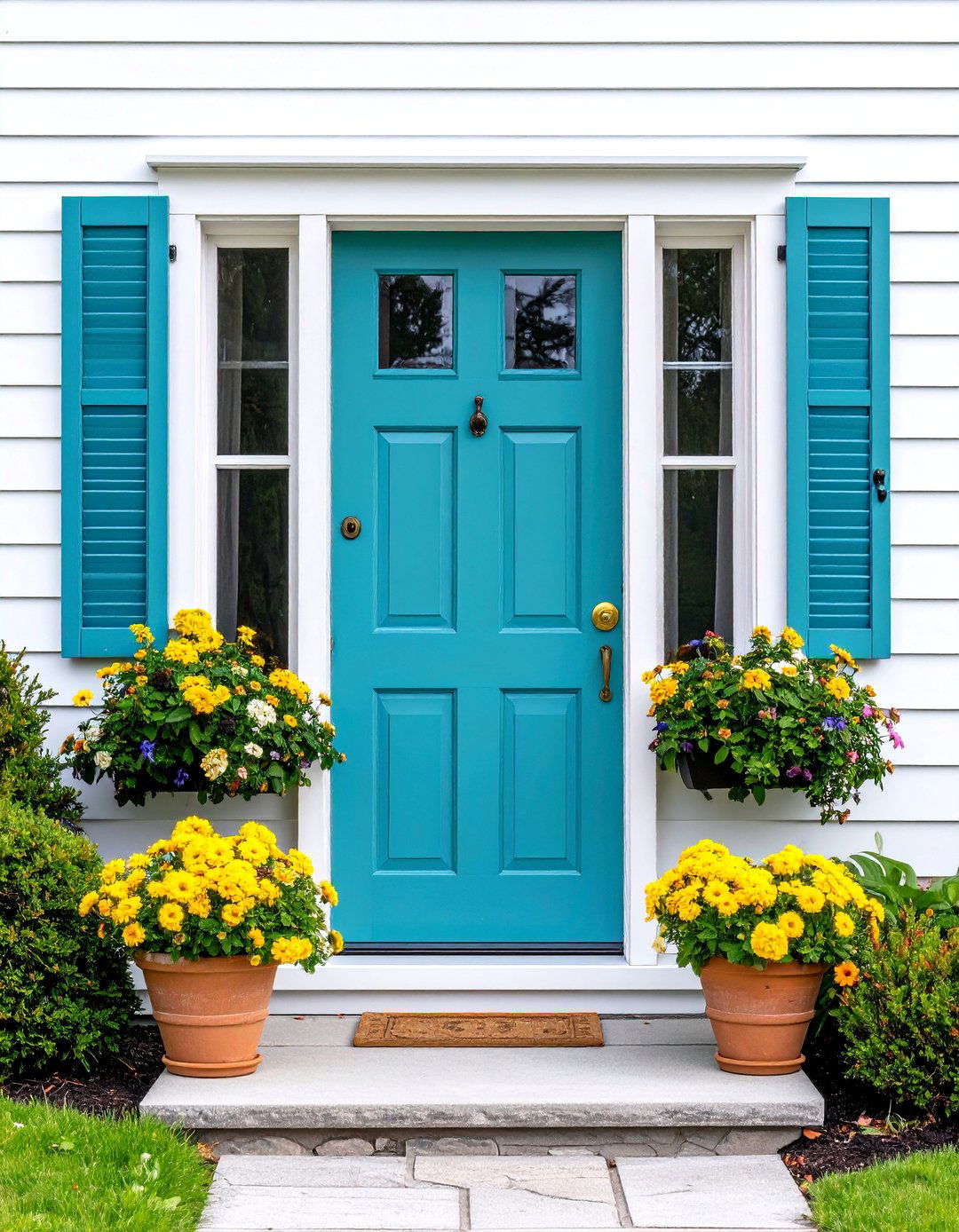
Leave a Reply